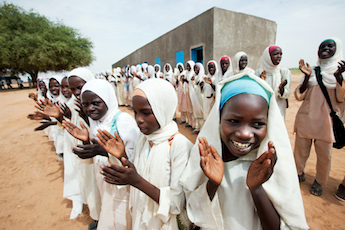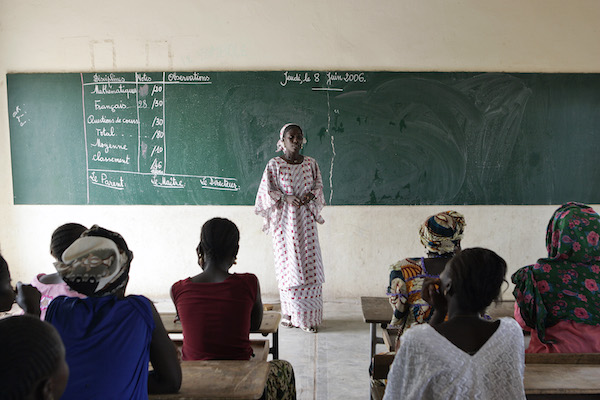Water and Gender
Across low-income countries, women and girls have primary responsibility for management of household water supply, sanitation and health. Often, fulfilling these roles precludes any other occupation or participation in education, and their marginalization is compounded by the indignity and insecurity of having nowhere private to go to the toilet. Addressing the needs of females in relation to water, sanitation and hygiene is a key driver in achieving gender equity and locking the potential of half of global society.

Girls in Kuma Garadayat, North Darfur, celebrate the inauguration of their new school as part of the six development projects in the areas of education, sanitation, health, community development and women empowerment. Photo by Albert González Farran - UNAMID
Challenges
In many countries, the presence or absence of a safe and sufficient water supply and improved sanitation facilities has a disproportionate effect on the lives of women and girls for three main reasons. First, women and girls usually bear the responsibility for collecting water, which is often very time-consuming and arduous. Second, women and girls are more vulnerable to abuse and attack while walking to and using a toilet or open defecation site. And third, women have specific hygiene needs during menstruation, pregnancy and child rearing.
Rural women in Senegal attend a literacy class after the introduction of the Multifunctional Platform Project (MFP) by the United Nations Development Programme (UNDP), because they no longer need to spend several hours a day gathering firewood or collecting water. UN Photo/Evan Schneider
Opportunities
At the local level, gender-sensitive approaches are helping to improve the suitability, sustainability and reach of water and sanitation services by both focusing on and involving women in the facilities’ design, implementation and management. Embedding gender equity into policy at all levels will be crucial to achieving water and sanitation for all, which in turn will help advance many other parts of the SDG agenda, particularly education and work.Links
- IFAD (2012): Gender and Water – Securing water for improved rural livelihoods
- UNDP: Gender and Water
- UNICEF: Gender and water, sanitation and hygiene (WASH)
- UNESCO WWAP Overview of resources on gender-sensitive data related to water
- UN-Water: Gender, Water and Sanitation – A Policy Brief
- UN Women: Women and the Sustainable Development Goals
- WaterAid: Water and Women
- WHO/UNICEF (2019): Water, sanitation, and hygiene in health care facilities: Practical steps to achieve universal access for quality care.

